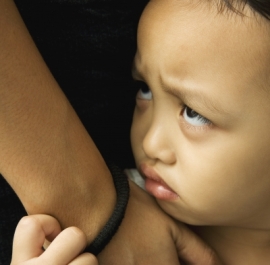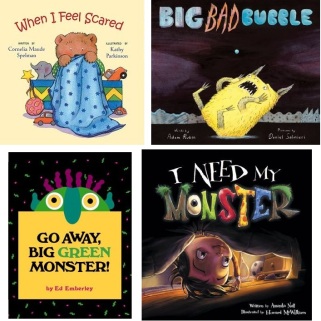Fears are normal in childhood; they develop for several reasons. Young children have a difficult time distinguishing between things that are real and things that are not. Add that to their vivid imaginations, what they have seen on TV and other media, and experiences that have caused them real fear (being lost, being hurt, etc.), and you have all the factors necessary for fears to develop.
Sometimes fears can develop that weren’t there before. Children’s fears can be puzzling to adults, but with a little patience and understanding, we can help children overcome them. Try the following strategies:
- Encourage children to verbalize their fears. Help them work through unrealistic thoughts. For younger children, pay very close attention to nonverbal cues to gain an accurate understanding of what is frightening them so you know how to help.

- Find children’s books that relate to the fears they are experiencing. Literature can help teach children coping strategies and can also help them begin to talk about their fears. Ask for suggested titles at your local library or book store.

- Use practical solutions whenever possible. For children who are afraid of a monster in their closet or under their bed, check those places to put their minds at ease. Plug a nightlight in for children who are fearful of the dark. Ask those who are able to talk what might make them feel better. If they don’t like elevators, they may feel better if you pick them up or hug them while inside, or take the stairs!

- Build a sense of control. When children feel in control, they often become more comfortable in situations that cause them fear or anxiety. For example, allow children who are afraid of elevators to press the button when they are ready for it to move. For children who are afraid of a flushing toilet, let them flush it themselves when they are ready. Always stay nearby, and reassure children as necessary.

- Accept that some of children’s fears are valid and may help protect them. A fear of dogs or strangers may be a good thing. A healthy sense of caution is a plus!

Keep in mind that if children’s fears last too long, have become disabling, or are negatively affecting development, it’s time to consider seeking the help of a qualified professional who has experience working with young children. It is important to prevent fears from impacting children’s lives long term.
Always remember to be patient. The length of time it takes individual children to overcome their fears can vary greatly. It may be a few days or it may be several months. Avoid forcing children to confront their fears directly since it can make the situation worse. If children must be exposed to the fear, gradual exposure is best. Regardless of what fears children are dealing with, taking steps to make them feel safe and secure along the way will be helpful.
Back to blog listing